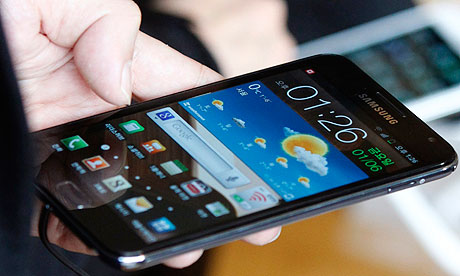
The Samsung Galaxy smartphone, which runs the Google Android operating system. Photograph: Kim Hong-Ji/Reuters
Android is a huge success. Google bought Andy Rubin's company in 2005 and turned it into a smartphone operating system giant, with more than 50% of the global market and 700,000 activations a day this past December.
Perhaps, as Steve Jobs seemed to think, it was Eric Schmidt's position on Apple's board of directors that infected Google with an itch to enter the smartphone OS market. Or maybe Larry Page and Sergey Brin simply recognised the Next Big Thing when they saw it. (As Page points out, the company had begun Android development a year before Schmidt joined the Apple board.)
Regardless of the "authenticity" of Google's smartphone impulse, it's the execution of the idea, the integration of Android into Google's top-level strategy where the product really shines.
Android improves quickly; the "free and open" platform is popular with developers and, perhaps even more so, with handset makers who no longer have to create their own software, a task they're culturally ill-suited to perform.
And everyone loves being associated with a technically competent winner. (I might be a little biased in my regard for the Android engineering team: comrades from a previous OS war work there.)
For the past three years, Android has experienced a kind of free space expansion: The platform has grown without hitting obstacles. I'm not ignoring the IP wars, they're real and the outcome(s) are still unclear, but these fights haven't slowed Android's triumphant march.
As we enter 2012, however, it seems the game may be changing. Looking at last week's numbers for Motorola, HTC and Samsung, we see a different picture. Instead of the old "there's more than enough room for every Android handset maker to be a winner", we have a three-horse's-length leader, Samsung, while Motorola and HTC lag behind.
From October to December of last year, aka Q4CY11, Samsung is said to have shipped 35m smartphones, taking it to the number one spot worldwide. Citing "competitive reasons", Samsung no longer makes its sales/shipment numbers public, so we have to rely on ''independent" observers to tally up the score.
Having worked in the high-tech industry for decades, I've seen how this information game is played: firm XYZ sells its "research" to manufacturer W ? and ends up as its mouthpiece. I'd love to follow the money, but these private firms don't have to reveal who their clients are and how much they pay for their services.
For a more detailed discussion of these shenanigans, read an excellent piece by the Guardian's Charles Arthur: Dear Samsung: could we have some clarity on your phone sales figures now?)
But even if we "de-propagandise" the numbers, Samsung is clearly the number one Android handset maker, and, just as clearly, it's taking large chunks of market share from the other two leading players: Motorola and HTC both announced lower than expected Q4CY11 numbers. HTC's unit volume was 10m units, down from 13.2m in Q3; Motorola got 10.5m units in Q4, down from 11.6m in Q3.
This leaves us with the potential for an interesting face-off. Not Samsung v Motorola/HTC, but ? Samsung v Google. As Erik Sherman observes in his CBS MoneyWatch post, since Samsung ships close to 55% of all Android phones, the company could be in a position to twist Google's arm. If last quarter's trend continues ? if Motorola and HTC lose even more ground ? Samsung's bargaining position will become even stronger.
But what is Samsung's ''bargaining position''? What could they want? Perhaps more search referral money (the $$ flowing when Google's search engine is used on a smartphone), earlier access to Android releases, a share of advertising revenue?
Will Google let Samsung gain the upper hand? Not likely, or at least not for long. There's Motorola, about to become a fully-owned but "independent" Google subsidiary. A Googorola vertically-integrated smartphone line could counterbalance Samsung's influence.
And so it would be Samsung's move ? and they wouldn't be defenseless. Consider the Kindle Fire example: Just like Amazon picked the Android lock, Samsung could grab the Android Open Source code and create its own unlicensed but fully legal smartphone OS and still benefit from a portion of Android apps, or it could build its own app store the way Amazon did.
Samsung is already showing related inclinations with its Music Hub and its iMessage competitor.
Samsung is a tough, determined fighter and won't let Google dictate its future. The same can be said of Google.
This is going to be interesting.
JLG@mondaynote.com
Source: http://www.guardian.co.uk/technology/2012/jan/09/samsung-google
oregon ducks oregon football lana turner donald glover julio cesar chavez jr jason segel turducken
No comments:
Post a Comment
Note: Only a member of this blog may post a comment.